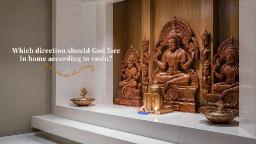

Bringing divine energy into your living space brings peace and harmony. Knowing which direction God should face in home as per Vastu plays a vital role in ensuring positive vibrations flow through your house. If you want your home to radiate spirituality and good energy, this guide will help you understand the best practices, backed by traditional Vastu principles and practical experience
Vastu Shastra, the ancient Indian science of architecture, emphasizes aligning spaces with cosmic forces to bring health, wealth, and happiness. In this context, the direction in which the deity faces inside your home significantly influences the flow of energy. Placing idols or pictures of God facing the right direction can increase positive energy, improve concentration during prayers, and promote overall wellbeing.
Experts in Vastu agree that God’s placement must harmonize with the cardinal directions, each carrying unique characteristics and energies. Aligning God’s face properly enhances the spiritual aura and balances energies in the home.
Placing God facing East welcomes the morning sun’s rays, considered pure and energizing. This direction symbolizes new beginnings, enlightenment, and hope. When God faces East, worshippers can benefit from enhanced positivity and mental clarity. Many Vastu consultants recommend East-facing idols for meditation and prayer rooms to promote calm and rejuvenation.
North represents wealth and prosperity, governed by the planet Kubera, the god of riches. When God faces North, the home tends to attract abundance and success. This direction supports growth in career and financial stability. North-facing deities align well in the pooja room or main prayer area to encourage material and spiritual progress.
South and West carry different energies that may not always suit the positioning of God’s idols.
South relates to Yama, the god of death, and often brings more challenging or restrictive energies. Placing God facing South can disturb harmony and is generally discouraged. It might affect peace of mind and create obstacles.
God facing West might restrict energy inflow. Though not completely forbidden, it requires caution and usually comes with specific Vastu adjustments. West is related to the end of cycles, which may bring closure but less of renewal or growth.
Lighting plays a significant role in energizing the pooja space. Soft natural light or traditional lamps can intensify the positive vibrations when God faces the right direction. Use fresh flowers, incense, and clean cloths to decorate the altar. Reflective surfaces like mirrors should not directly face the idol to avoid energy deflection.
Though East is highly recommended, North is equally auspicious. Both directions align with positive energy flow. Selecting either East or North depends on home layout and personal preference.
Worship’s sincerity matters most, but Vastu provides guidelines to enhance benefits from spiritual practices. Correct placement supports concentration, devotion, and overall peace.
Lord Ganesha facing East or North invites wisdom and removes obstacles. East-facing Ganesha is popular in homes and offices.
Lakshmi’s idols or pictures facing North enhance wealth and prosperity. Keep the space well-lit and clean to maximize benefits.
Placement should follow the general rules of facing East or North. Avoid placing idols directly opposite the entrance or under beams.
Even in modern apartments or compact houses, Vastu principles apply. With flexible arrangements, you can create a sacred space where God faces East or North without altering the entire layout. Portable altars and adjustable shelves help maintain correct directions in constrained spaces.
If the pooja room and God’s idol face the recommended directions, occupants often feel:
If you experience consistent disturbances or discomfort, reassess the direction and positioning of the deity.
Correcting these mistakes can immediately uplift the energy in the house.
Besides direction, sincere prayers, chanting mantras, and regular pooja enhance the divine presence in the home. Combining Vastu with these practices creates a balanced spiritual environment. Using natural materials like wood, brass, or marble for idols can add to the sacredness.
Aligning God’s direction with Vastu principles invites peace, prosperity, and positive energy into your home. Prioritize East or North facing idols in a clean, well-lit pooja space to maximize spiritual benefits. This practice not only honors tradition but also creates a sanctuary for mental calm and happiness.
For personalized guidance and deeper insights, feel free to contact us today.
East and North align with positive cosmic energies. East welcomes the rising sun’s energy, promoting enlightenment. North attracts wealth and prosperity, governed by Kubera, the god of riches.
Vastu advises against placing idols facing South, as it may bring negative influences. West-facing idols require careful adjustments and are generally less preferred than East or North.
Use a reliable compass or smartphone app to find the precise cardinal directions. Mark the pooja area accordingly to place the deity facing East or North.
Generally, all deities benefit from facing East or North. Specific idols, like Lord Ganesha, work well facing East, while Goddess Lakshmi aligns best facing North.
Keep all idols facing a consistent direction—preferably East or North—to maintain harmony and avoid energy conflicts.
Consult a Vastu expert for remedies such as mirror placement or energy correction techniques to compensate for layout constraints.
Absolutely. Cleanliness and adequate lighting enhance positive energy flow and respect the sanctity of the space.
Place idols on a raised platform or altar, away from the floor, to honor their sacredness and allow energy to flow freely.
Yes, pictures work well too. Ensure they face East or North and maintain the same pooja room conditions.
Yes, proper direction increases concentration, spiritual focus, and peacefulness during meditation or prayer.
| No comments yet. Be the first. |